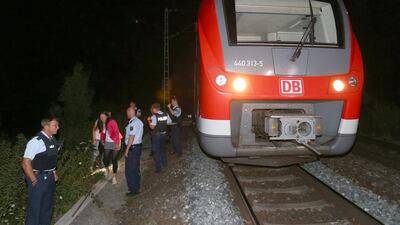BERLIN // Germany is likely to face more extremist attacks, its interior minister said on Wednesday, although he played down any link between the government’s open-door refugee policy and an axe assault aboard a train in Bavaria two days before.
“Like several EU countries, like the whole EU, Germany is also in the target area of international terrorism ... the situation is serious,” said Thomas de Maiziere.
Meanwhile, German authorities cast doubt over whether the teenager behind Monday’s train attack was really an Afghan refugee, saying he might have been from Pakistan.
Mr de Maiziere said the teenager was believed to be a “lone wolf” attacker who had been “inspired” by ISIL but was not a member of the group.
“This is perhaps a case that lies somewhere between a crazed rampage and terrorism,” the minister said.
He said investigators were still trying to determine the true identity of the 17-year-old who was shot dead by police following the train attack in which he injured five people, two of them critically.
ISIL released a video on Tuesday purportedly featuring the assailant, who announced in Pashto that he would carry out an “operation” in Germany, and presenting himself as a “soldier of the caliphate”.
German authorities said they had authenticated the video.
However, security service sources now think the teenager might have pretended to be Afghan on arrival in Germany in 2015 in order to have a better chance of securing asylum.
In the ISIL video the youth uses phrases of a dialect of Pashto spoken in Pakistan – not Afghanistan – and experts have indicated that his accent is clearly Pakistani. A Pakistani document was also found in his room.
Mr de Maiziere pointed out, however, that both Afghanistan and Pakistan had Pashtun communities and said German authorities had received an application for family reunification from the teenager for relatives in Afghanistan.
He added that investigators were also looking closely at accounts from the assailant’s foster family that he received a phone call on Saturday informing him of the death of a friend in Afghanistan and whether his apparent distress over the news was a possible trigger for the attack.
On Tuesday, authorities found a hand-painted ISIL flag and what they called a suicide letter addressed to the attackers’s father among his belongings.
Locals described the teenager as “calm and even-keeled” and a “devout Muslim who did not appear to be radical or a fanatic”, according to Joachim Herrmann, interior minister of Bavaria state.
But police said he wrote in the letter that the world’s Muslims “must defend themselves”.
“Now pray for me that I can take revenge on non-believers, pray for me that I can get to heaven,” the note said.
Prosecutors said the teenager shouted “Allahu Akbar” three times as he rampaged through the carriage.
Germany has so far escaped the kind of large-scale extremist attack seen in the southern French city of Nice last week, in which 31-year-old Mohamed Lahouaiej Bouhlel used a lorry run down and kill 84 people.
That attack was also claimed by ISIL without the assailant having clear ties to the group.
But anti-immigrant party Alternative for Germany (AfD) has seized on the Bavaria train attack to criticise chancellor Angela Merkel’s migrant policy, under which some 1.1 million people entered Germany in 2015. Syrians made up the largest group followed by Afghans.
“You cannot say there is no connection between refugees and terrorism, but the danger was high before and remains high, regardless of questions about refugees,” Mr de Maiziere said.
The attacker in the train stabbing incident arrived in Germany as an unaccompanied minor in June 2015 and had been staying with a foster family in the region of the attack for two week prior.
* Agence France-Presse, Reuters

